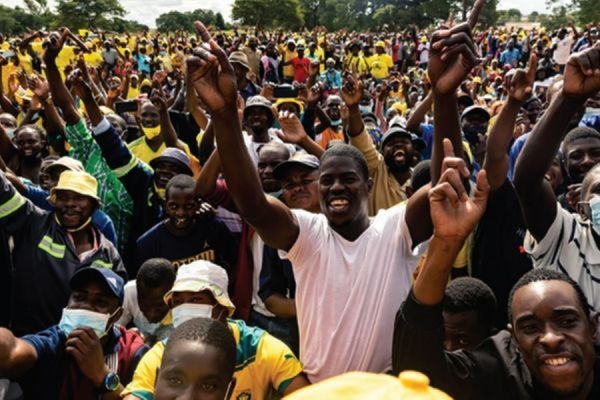
Zimbabwe’s recent by-election results show next next year’s crucial presidential poll could go either way. By Christopher Clark in Cape Town. On March 26, Zimbabwe finally went to the polls in parliamentary by-elections that had been slated for December 2020 only to be repeatedly delayed due to Covid restrictions. Considered by many analysts as a test run for the 2023 general elections, the run-up to the March by-elections were beset by routine and occasionally violent repression of the opposition and alleged electoral irregularities. While this has been an increasingly familiar trend in Zimbabwean elections since the emergence of the late Morgan Tsvangirai’s Movement for Democratic Change (MDC) in 1999, many Zimbabweans still saw cause for optimism in the wake of these latest polls. In particular, a new party called the Citizens Coalition for Change (CCC), which was only founded in January this year, won 19 out of the 28 parliamentary seats up for grabs. This was a particularly significant victory for the party’s leader, Nelson Chamisa, who had been forced out of an increasingly fractured and factionalised MDC after the 2018 elections. Chamisa had come within one per cent of forcing the ruling Zanu-PF and Robert Mugabe’s successor Emmerson Mnangagwa into a run-off in a vote marred by allegations of widespread rigging.
‘CCC’s entry has re-energised opposition politics in Zimbabwe,’ said Blessing Vava, a Zimbabwean journalist and the director general of Crisis in Zimbabwe Coalition, a conglomeration of more than 75 local civic society organisations.
‘Zanu-PF thought they had done away with opposition politics, that they’d done away with Chamisa. But despite all their banning of rallies, all the violence and intimidation, the CCC still managed to get all of those seats against the odds.’
Opposition supporters outside Rudhaka Stadium in Marondera where the party was banned from hosting an election campaign rally, on March 12, 2022. For its part, the CCC described the results as a ‘landslide’ victory, with Chamisa telling reporters in the immediate aftermath that ‘there is nothing that will stop us from forming the next government’. Many independent Zimbabwean media outlets and political commentators expressed a similarly effusive response to the vote, noting that the previously divided opposition has largely unified around Chamisa, putting an end to years of in-fighting. However, Nicole Beardsworth, a political scientist and lecturer at the University of Witwatersrand in Johannesburg, South Africa, said that while the CCC had done ‘remarkably well, particularly as it was effectively campaigning with at least one arm tied behind its back’ there was still ‘reason to be cautious’. Firstly, Beardsworth noted that of the 28 seats contested, 20 had become vacant after the controversial recall of the sitting representatives between May and October 2020 by an MDC faction led by Douglas Mwonzora.
‘These were almost all seats in urban areas and the opposition has won most of these areas overwhelmingly since the MDC was first formed, so essentially it would have been a surprise if the majority of those seatsdidn’tgo to the CCC,’ Beardsworth explained.
‘I think many of the voters in these areas could discern that this was effectively the same opposition party they’d voted for in 2018.’
The other eight seats being contested were in rural or peri-urban areas, which traditionally form the bulwark of Zanu-PF’s support, and were retained or won by the ruling party.
‘Part of the reason any triumphalist narrative is premature is that in those rural seats Zanu-PF’s proportion of the vote actually increased by roughly 10 per cent overall, which suggests that their popularity is actually growing in these areas,’ Beardsworth added. For Ringisai Chikohomero, a Zimbabwean researcher at the South Africa-based Institute for Security Studies, the arrival and early success of CCC also provides the ruling party with an opportunity to re-strategize and ‘test how watertight its systems are ahead of next year’. Chikohomero said particular attention should be paid to potential manipulation of the voters’ roll. In the run-up to the by-election, Team Pachedu, an online Zimbabwean pressure group, claimed that that the names of at least 165,000 people on the roll had been moved to different wards and constituencies without notice, leading to confusion and the prospect of some people having to travel long distances to vote. It also accused the Zimbabwe Electoral Commission of accepting voters with unknown addresses, which is against the law, and said that about 40,000 voters had been removed from the roll without due process. The Zimbabwe Electoral Commission defended itself against the allegations, saying they were intended to smear the organisation. But Vava told News Africathat the commission, which is widely accused of Zanu-PF partisanship, had ‘failed to account for the irregularities’. A more pressing concern for the CCC is the increasing political apathy of a Zimbabwean public preoccupied with survival following decades of economic stagnation and two years of damaging Covid lockdowns.
‘Will people be willing to lose a day’s income to go out to vote when many of them will feel that they can already guess what the outcome of the election is likely to be?’ Beardsworth asked.
‘That remains an open question.’
But Vava is determined to hold onto an ounce of hope, citing the unlikely opposition victory in neighbouring Zambia last year,which saw high voter turnout and was significantly influenced by young, first time voters.
‘If Zimbabweans turn out to vote in their numbers, I can see a victory for the opposition,’ Vava said.
‘I don’t see Zanu-PF winning a free and fair election, so it all depends on the opposition’s ability to protect the vote.’
Source: NewsAfrica


